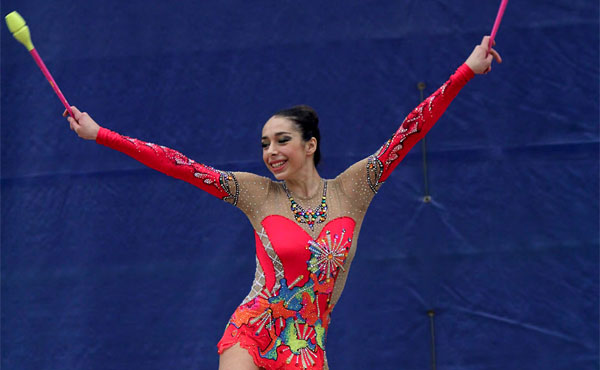
By Jo-Ann Barnas – Special to USA Gymnastics
It wasn’t just the right decision, but the only one Rebecca Sereda could make.
When doctors told her that she had exhausted all options in her two-and-a-half year battle trying recover from a series of serious lower back injuries, the three-time reigning U.S. senior rhythmic all-around champion knew it was time.
And so on April 30, drained from pushing through pain while trying to train and compete at the highest level, Sereda retired from the sport.
Five days later – on May 5 – she celebrated her 19th birthday. And she did so with a smile on her face.
“The past two years, I spent my birthday on the way to France for a World Cup, so it’s nice to be home,” Sereda said this week from her home in Staten Island, N.Y.
Sereda was one of the nation’s top rhythmic athletes in the history of the sport. Her grace and athleticism were the bookends of a long career (eight years) on the U.S. national team. She had just one head coach the entire time — Natalya Kirenko – whom Sereda describes as being like a second mother.
In addition to winning a total of six all-around national titles (three as a senior, and three as a junior), Sereda competed in the last two World Championships. She made the all-around finals in 2013 in Kiev, Ukraine – an iconic moment for USA Gymnastics.
“An incredible girl,” said Caroline Hunt, Director of the Rhythmic Gymnastics Program at USA Gymnastics. “She’s been a historic gymnast for us. It’s hard to talk about her without having so many different emotions. She’s a sparkling girl. I never heard her feel sorry for herself. She exemplifies all the right things, and how to appreciate life. That’s the legacy of her leadership, how she has carried herself.”
Sereda lost her mother to gastric cancer when she was 8 years old. A year after that, Rebecca won her first Junior Olympic title.
“My gymnastics career has been one of the most intense, crazy things in my life – and it’s definitely shaped me as a person,” Sereda said. “When I was young, when I started out in gymnastics, I was also doing dance. I had a competition in both dance and gymnastics on the same day so my mom sat me down and said, ‘Listen, you’re going to have to choose one sport.’
“I was doing dance for four years and gymnastics for less than a year, and I still chose gymnastics. I was 7. I felt something about the sport. It was a pretty large choice to make for me in my life. But gymnastics has always been there for me. When my mom passed away, it helped me. It was me and the gym, me and my routines. It was positive energy.”
Sereda said she said she didn’t start having trouble with her back until October 2012.
“To be honest, our backs are always a little sore, so I thought it was nothing,” she said. “I gave myself a little break, but it wasn’t going away.”
Over time, the pain in her lower back increased and became chronic. She said she has been diagnosed with a variety of conditions, including herniated discs and arthritis.
Sereda said she realized the severity of her injuries at nationals last year in Louisville, Ky., where she tied for the all-around title and won hoop and ball, and captured a silver medal in ribbon.
“I competed at nationals and at (World) Championships without feeling in my (right) leg, which is my balancing leg, my turning leg – the leg I had to do everything on,” Sereda said. “I had to compete without feeling in that leg at the highest level.
“Competition days were kind of a mystery, unfortunately. I had a warm up. There was nothing that was going to help.”
She said her back “got really bad’’ at the end of December 2014. After an injection, she rested for six weeks.
“I felt a little better and then it went right back to pain,” she said.
About a month ago, after a series of evaluations and discussions with everyone involved in her career, a decision was made to retire.
“Gymnastics was my passion,’’ Sereda said. “The Olympics (next year in Rio) was a goal, and I had said I wasn’t going to retire until I did absolutely everything possible.
“But if I was to continue – which I wanted to do for the next two years – it was going to get worse. My other body parts started compensating for it. My hips started hurting, and it started escalating.”
She said the decision was made a little easier when she realized that she had the support of everyone around her.
“Unfortunately, I don’t feel I’ve reached my prime, but I knew it was my time to retire,” Sereda said. “Finding out before the 2015 season that I wasn’t going to be able to compete, my world was shattered but I had to realize that there is so much more I can do. That goal (of the Olympics) would be only six minutes of my life, and don’t want to suffer my entire life.
“I was always a fighter. I was always driving and ambitious. I had put off college (last year).”
But not anymore.
As Sereda was contemplating whether to continue her rhythmic career earlier this year, she dutifully sent off a few college applications – “just in case,’’ she said.
The result of that effort felt like she had struck gold again: She was accepted into NYU and Boston University. She’ll decide soon which to attend.
“I’ve always had excellent grades and was an honor student,” Sereda said. “But gymnastics was first in my heart.”
Although it still is, she accepts that there’s another phase, a new competition, that’s just beginning in her life. At the moment, she’s thinking of majoring in pre-med.
“I remember in gymnastics, I never sat in my room and cried if I had a bad score,” she said. “I was always positive. I always want to have a good attitude.”
Remember: Always equals forever.




